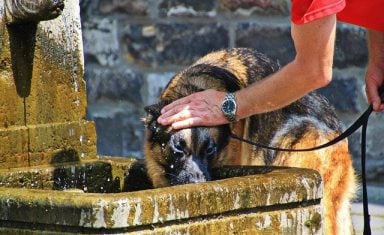The first image many of us have of rabies is an animal, driven to the heights of aggression while foaming at the mouth. This image is driven by movies like Old Yeller, books such as Stephen King’s Cujo and even children’s films such as Over the Hedge. These have skewed the public’s understanding of rabies and its signs.
Let’s review the facts:
Rabies is caused by a virus. Rabies only affects mammals, and it can affect any type of mammal: Cats, dogs, squirrels, cows, and humans. An animal with rabies sheds the virus in its saliva and mucous secretions. Direct contact such as a bite is required to spread the virus. Rabies does not survive in the environment, only in host animals.
The scary thing about rabies is that after a bite, it can take up to a year before the pet or human shows clinical signs. Once infected the virus moves into the nervous system of the animal. It hides out here, invisible to the pet’s immune system, until it migrates to the brain. In addition, the animal is actually shedding the virus ten days before the clinical signs are seen.
The virus can affect animals in two forms. The first is the furious form—this is the one that inspired all the pop culture representation. These are aggressive animals that will try to attack you. The second form is the dumb form. In this form, the animal can show neurologic signs such as weakness, drooling, bumping into objects, and a change in personality. Some affected animals can also show a voice change.
Prevention
Bats, raccoons, and skunks are the most common carriers of rabies in Central Virginia. Since bats are one of the most common carriers, even pets that remain indoors should be vaccinated. In fact, this is required by Virginia State law. Your pet should receive its first rabies vaccine at four months of age. Virginia law requires a booster at one year of age. If your pet is not vaccinated or up to date on their vaccines and bites a person, they will need to either have a forced quarantine period of six months or be euthanized and tested for rabies.
If your unvaccinated pet was attacked by an animal afflicted with rabies, it will be euthanized.
If your pet is up to date on its rabies vaccine and gets bitten, they should receive an immediate booster and a 45 day observation period.
If your pet is attacked by a wild animal and kills it, the animal’s body should be brought to your veterinarian for rabies testing. If you are bitten by a wild animal and kill it, the body should be brought to your veterinarian for rabies testing. If you are bitten by an unvaccinated dog not showing signs, the animal should be placed in quarantine for 10 days of observation as rabies is only shed 10 days before showing clinical signs. No person in the United States has ever contracted rabies from a dog, cat or ferret held in quarantine for 10 days.
Rabies is very rare in vaccinated animals. It is however endemic in our area. The best prevention method is avoiding animals that are not acting normal. This could be a raccoon running around in the day; they are normally nocturnal. This could be a skunk charging towards you and your pet. This could be the neighbor’s sweet dog that is not acting like itself or is suddenly aggressive. If you find a pet on the side of the road, injured, move slowly and use precautions. If the animal was hit by a car, they are likely in a great deal of pain and are apt to bite you. As always in any bite case, you should seek medical attention. Be cautious and avoid placing yourself in dangerous situations. Even small bites can become infected and have grave consequences. Keep your pets up to date on their rabies vaccinations. This protects both of you.
For more information, contact our team at VETSS!



